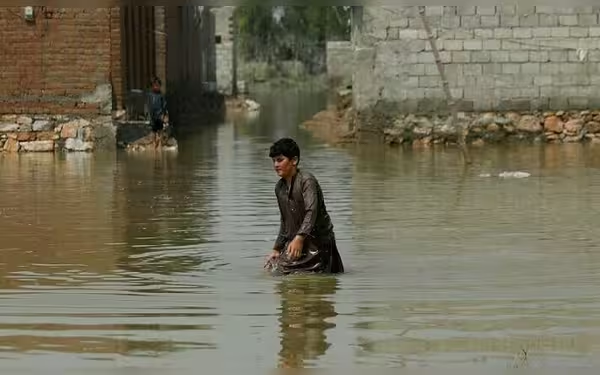Saturday, November 16, 2024 07:35 PM
Pakistan's Urgent Call for Climate Action at COP29
- Pakistan seeks financial support for climate resilience.
- Senator Sherry Rehman demands contributions from developed nations.
- New climate finance goal proposed at COP29.
 Image Credits: dawn
Image Credits: dawnPakistan emphasizes urgent climate action and financial support at COP29 to combat climate change impacts.
As the world grapples with the pressing issue of climate change, countries are convening in Baku, Azerbaijan, for COP29, a significant climate summit. This gathering is crucial for nations, both large and small, to discuss strategies for climate adaptation and mitigation. Pakistan, a country that is particularly vulnerable to the impacts of climate change, is participating with a focus on three key areas: climate justice, energy transition, and gender-responsive climate policies. The nation aims to highlight its commitment to sustainability through initiatives like the Living Indus project and Recharge Pakistan.
However, the challenge that looms large is the need for substantial financial support to implement these programs effectively. While developed nations have reported an increase in international public adaptation financing from $22 billion in 2021 to $28 billion in 2022, this rise is hardly sufficient. The World Bank estimates that Pakistan alone requires a staggering $348 billion by 2030 to build climate resilience. Furthermore, the current pledges to the Loss and Damage Fund, which amount to only $770 million, underscore the inadequacy of global financial commitments.
Senator Sherry Rehman has rightly emphasized the need for 'Internationally Determined Contributions' from developed nations to assist climate-vulnerable countries like Pakistan. It is a stark reality that nations contributing minimally to global emissions are bearing the brunt of climate impacts. The catastrophic floods of 2022, which inflicted $30 billion in damages, alongside this year’s severe cross-border smog in Punjab, serve as grim reminders of our vulnerability to both sudden disasters and chronic pollution.
This year’s discussions at COP29 will aim to establish a new climate finance goal that exceeds the previous commitment of $100 billion annually set by the Paris Agreement. Developing nations are advocating for climate finance to be provided as grants or with significant concessions, rather than the usual loans, to help ease their mounting debt burdens. Azerbaijan has proposed a $1 billion Climate Finance Action Fund, funded by fossil fuel producers, which seeks to support disaster response and community initiatives, presenting a novel approach to financing.
Amidst these discussions, Pakistan’s government appears to be taking its participation at the summit seriously. The parliamentary committee on climate change has called for transparency and measurable outcomes from the summit. However, achieving success in the long run will require more than just government initiatives. Engaging the private sector and strengthening provincial climate initiatives will be essential.
The Global Climate Finance Framework, already signed by 15 nations, presents Pakistan with an opportunity to bolster its position in climate negotiations. As a climate-vulnerable nation, Pakistan must leverage its moral authority while demonstrating a serious commitment to both adaptation and mitigation efforts at home.
The stakes are high as Pakistan navigates the complexities of climate change at COP29. The nation must not only advocate for financial support but also take decisive actions to protect its environment and its people. The time for meaningful climate action is now, and it is imperative that Pakistan stands firm in its commitment to a sustainable future.













